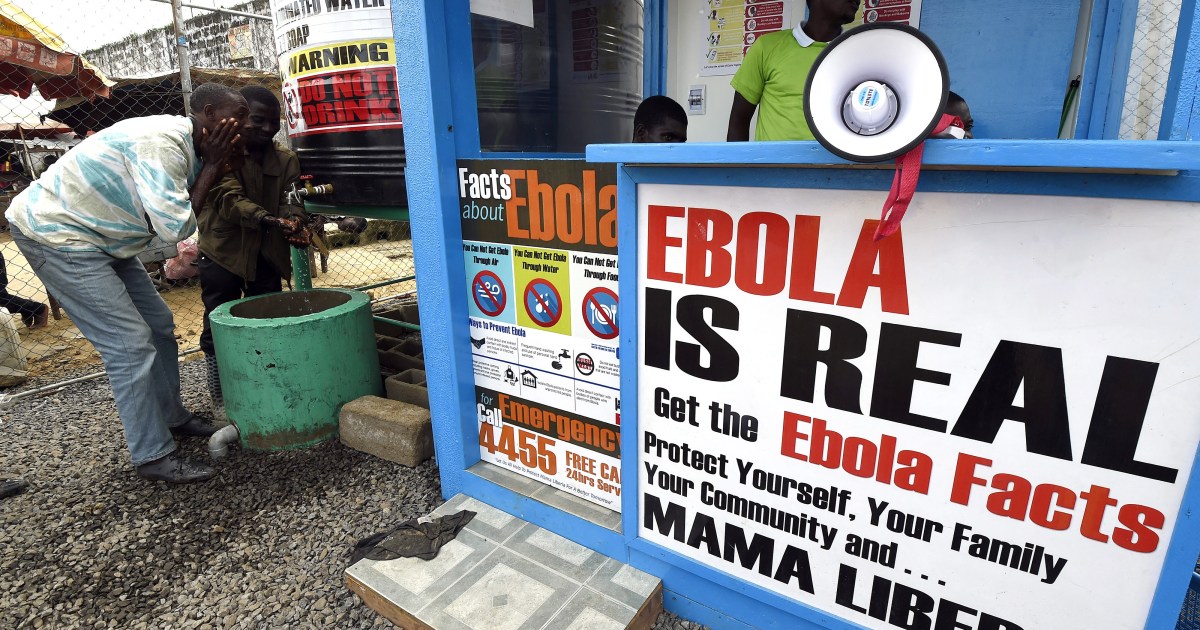Gouecke, Guinea – Guinean officials are in a race against time to limit the spread of an Ebola outbreak after several infections from the deadly disease were detected in the south of the country last week.
The West African country declared an Ebola epidemic on February 14, two weeks after the patient attended a nurse’s funeral in the city of Gouecke and later developed symptoms of the disease, including fever, diarrhea and vomiting.
Among confirmed and suspected cases – the nurse, five family members and a traditional healer she consulted – five died and two are currently in isolated treatment.
Despite the ban on meetings of more than five people, including weddings and weekly fairs, people in Gouecke seemed skeptical of government directives and the resurgence of a disease that killed some 2,500 Guineans during a previous epidemic that hit Africa Western between 2014 and 2016.
“We are not afraid and we are not worried,” said Paul Lamah, who was among the residents who defied the ban and attended Gouecke’s weekly market on Saturday.
“We know that God is with us. If the authorities want to lie to get money from their partners [aid organisations], they shouldn’t say that. But for us, there is no Ebola. “
Echoing his feelings, Fatoumata Diabate, a red oil seller from N’Zerekore, said the containment measures announced by the government pose a threat to people already struggling to survive.
“Our husbands finished their studies, but they found no work. We are responsible for our families, that’s why we came to sell our production, to find what to eat ”, said Diabate in the market.
“We have to stop getting tired of this Ebola outbreak story. Furthermore, we do not believe in this disease. These are just rumors because we have never seen a patient or person who died of this disease. “
‘Vital’ community involvement
In this context, Guinean authorities, in partnership with international experts, are trying to establish the full scale of the outbreak.
Efforts include tracking people who have potentially come in contact with Ebola patients to monitor their health and interrupt the chain of transmission. Security forces have also established checkpoints to measure temperatures and isolate those who look ill.
Neighboring countries are also on high alert to avoid a repeat of the previous outbreak that killed more than 11,300 people in Guinea, Sierra Leone and Liberia.
Sierra Leone authorities sent workers to entry points on its border with Guinea to assist border patrols and health workers while Liberia increased its threat level and “increased surveillance and preventive activities”.
The resurgence of ebola may harm the already strained health systems in countries in the region, at a time when they are also battling the coronavirus pandemic.
Health experts emphasize that providing good and clear health education information is critical at the beginning of a response to Ebola, but in Gouecke some residents argued that the apparent mess of messages played a role in people’s reluctance to follow authorities’ directives.
“Why do they want to stop the market when the kids are still at school, three or four sitting on the same bench all week,” said Foromo, a resident of Gouecke.
A city official speaking on condition of anonymity told Al Jazeera that the authorities considered sending security forces to enforce the ban, but ultimately decided against the measure.
The source said an important factor in the decision was fear of escalating tensions and potential clashes between security forces and market goers, something that happened in 2014.
This was corroborated by a gendarmerie commander who said the security forces had not received any orders to enforce the ban.
“Community involvement is particularly vital,” said Anja Wolz, the Ebola Emergency Coordinator who oversees the response from Doctors Without Borders, also known as Doctors Without Borders (MSF). “You need to invest time and energy to speak to – and listen to – communities in the affected areas. You need to adapt the response to what they say and you need them to adapt to Ebola risks. It has to be a two-way conversation. “
Listening to and interacting with local residents is also critical to the successful launch of a successful vaccination campaign to help fight the hemorrhagic fever epidemic, experts say, citing the current existence of Ebola vaccines as a major differences from the last outbreak.
The expected arrival of about 11,000 doses of the vaccine developed by Merck in the country was postponed due to bad weather on Sunday, with vaccination now scheduled to start on Tuesday instead of Monday.
Even so, the authorities fear that the local population will not enroll in the vaccination program.
“People don’t want to believe [in Ebola] and associate the disease with something else. Nobody plans to get the vaccines, ”a city official told local media.
“Citizens do not want to hear anything from us and that worries us about vaccination.”
Health Minister Remy Lamah, a native of Gouecke, arrived in his hometown on Saturday to convince people of the merits of getting the vaccine, the source said.
“It all comes down to community involvement,” said MSF’s Wolz. “We have seen this many times in the past. If a community feels involved, heard and empowered, the response to Ebola is likely to be good, with or without vaccines. But if a community feels marginalized, unknown, and nervous or suspicious, then an Ebola response is likely to face multiple difficulties, with or without vaccines.
Facely Konate reported from Gouecke and Ramy Allahoum from Doha
